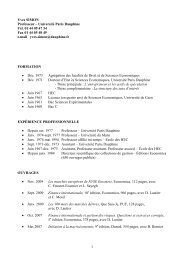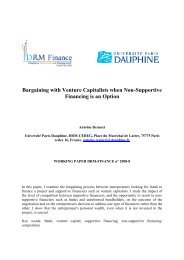Corporate governance and earnings management ... - CEREG
Corporate governance and earnings management ... - CEREG
Corporate governance and earnings management ... - CEREG
You also want an ePaper? Increase the reach of your titles
YUMPU automatically turns print PDFs into web optimized ePapers that Google loves.
accounting system has gone from a pure static to a dynamic stance. The reason for this decline<br />
is presumably linked with the “conglomeration mania” <strong>and</strong> the “massive expansion of<br />
corporations that had occurred during the 1960s” that “resulted in poor performance” <strong>and</strong><br />
“huge debt burdens” in the 1970s (LS, p. 15-17): to face this situation big American<br />
corporations were obliged to switch their accounting system to a dynamic one.<br />
The same economists show that in the 1980s “as part of a parcel of the Reaganite<br />
revolution” (LS, p. 14), there was a new phenomenon with “the exclusive focus on<br />
shareholder value” (LS, p. 14). Due to problems of performance <strong>and</strong> international competition<br />
the American economy switched towards a more financial approach with a focus on shortterm<br />
gains (LS, p.15-16). There were progressively a deregulation of the banking sector in<br />
favor of saving <strong>and</strong> loans institutions (LS, p. 17). There was also a rapid development of<br />
pension <strong>and</strong> mutual funds. This rise of the importance of the professional shareholders was<br />
accompanied by a decline of the strength of trade–unions in a context of job tenure decline<br />
(LS, p. 19-21). All these various <strong>and</strong> converging factors explain why the power went to shortterm<br />
oriented professional shareholders <strong>and</strong> why there were a strong trend towards maximal<br />
<strong>and</strong> short-term profits so as so a distribution of massive dividends experienced by the rise of<br />
pay-out ratios in the 1980s <strong>and</strong> 1990s (LS, p. 22, AR, p. 83).<br />
No wonder that the killing of the dynamic solution <strong>and</strong> the choice for the actuarial solution<br />
were the natural consequences of this evolution.<br />
In the course of that description, the managers have disappeared. As it is well known the<br />
place of managers in the context of the play of powers is a contested one. According to the<br />
famous Berle <strong>and</strong> Means’s thesis (1932), in most American big companies, the managers have<br />
taken the power due to the dispersion of shares. This thesis has also been used as one of the<br />
pillars of the agency theory whose main purpose is to find means to solve the (basic) conflict<br />
between managers <strong>and</strong> shareholders (Jensen & Meckling, 1978). But as soon as 1974, the<br />
Berle <strong>and</strong> Means’s thesis has been contested by Zeitlin (1974), <strong>and</strong> afterwards by many other<br />
61



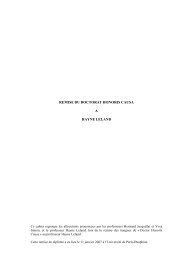
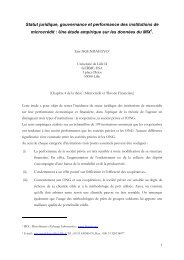
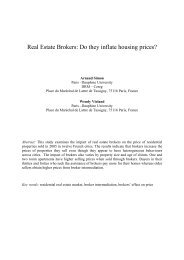
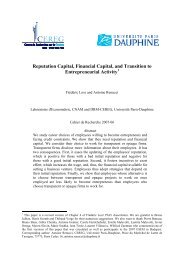
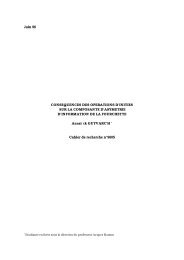
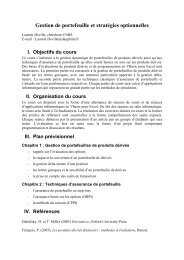
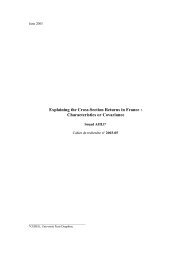
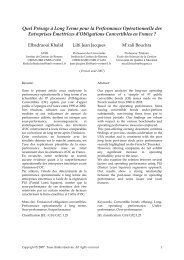
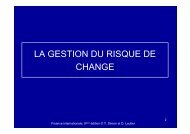
![& 6 ] ^ F ]^ - CEREG - Université Paris-Dauphine](https://img.yumpu.com/33326502/1/184x260/-6-f-cereg-universitac-paris-dauphine.jpg?quality=85)

